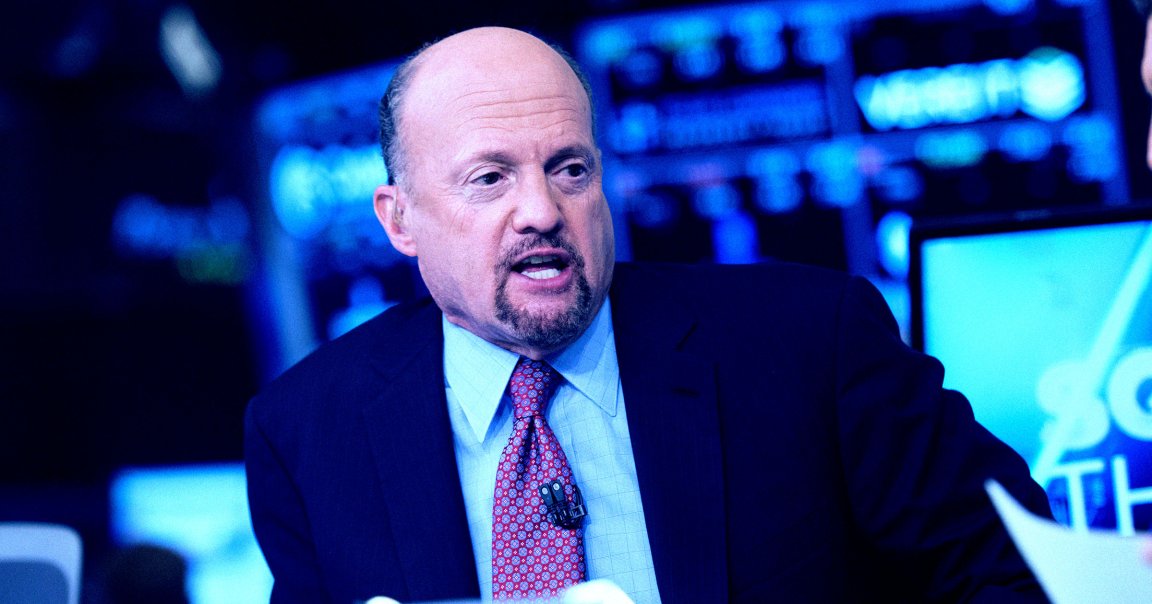
We’re not in the business of making financial recommendations, but CNBC personality Jim Cramer says there’s no bubble coming for the AI sector — which, given his track record, should probably make any AI investors just a bit nervous.
Now that Cramer — whose calls have historically underperformed so much that he inspired an entire phenomenon of people betting against him, called the “Inverse Cramer” effect — has chimed in on the topic, netizens are worried about an imminent collapse.
“Oh god, it’s worse than we thought,” one Reddit user wrote in a tongue-in-cheek post. “The grim reaper of finance has weighed in, the collapse of the global financial system is imminent.”
Cramer has made plenty of disastrous calls over decades. In February 2000, he proclaimed that internet-related companies “are the only ones worth owning right now” — right before the dot-com collapse. In 2012, he bet against stalwarts like HP, Netflix, both of which soared following his sell notice. Hes even been accused of playing a part in the 2008 financial crisis.
His latest prognostication? That he doesn’t believe the immense spending on AI infrastructure has any parallels with the dot-com bubble from 25 years ago — yes, the same one he didn’t see coming back in the day, either.
He’s breaking, of course, with experts who have drawn connections for quite some time now, with some arguing that the current AI bubble may be even worse than the market conditions leading up to the dot-com implosion of the early 2000s.
The stakes are considerable, with investors warning that spending on AI has contributed more to the growth of the US economy so far this year than all of consumer spending combined, foreshadowing a rude awakening. The sheer amount of resources being poured into AI could even mean that a crash could take down the US economy with it, some have argued.
As a result, Cramer has become the target of ridicule on social media.
The trouble started when Cramer pushed back against dot-com bubble comparisons on Monday, arguing that Big Tech is simply too big to fail.
“Speaking as an internet pioneer, what I see now is the polar opposite of what we were seeing 25 years ago,” he said.
“When the dot-coms made bad investments, nearly all of them went under,” he added. “But, worst case scenario, if Google and Amazon and Meta make bad investments and take big losses, that’s just another day at the office.”
Cramer argued that thanks to an enormous amount of available cash, tech giants could write off debt as needed — or pivot, if AI turns out to be a dead end.
However, the analyst remained optimistic about AI tech becoming useful enough to justify enormous spending.
Naturally, Cramer didn’t want to stick his neck out too much, arguing that he wasn’t willing to write off the “dot-com bomb scenario” entirely.
“See, the skepticism keeps things in check,” he said. “If there weren’t such a negative bent to the story right now, everyone would be in this pool, and we’d all drown.”
Whether others will agree with his line of thinking remains to be seen, especially as analysts see more and more red flags going up. Last week, AI chipmaker Nvidia announced a $100 billion investment in its own biggest customer, OpenAI, once again fueling fears over an AI bubble.
Analysts called it out as an example of “circular financing,” with Nvidia propping up a company important to its own bottom line.
“It’s kind of like having your parents co-sign on your first mortgage,” Bloomberg‘s Jay Goldberg argued, describing the deal as “bubble-like behavior.”
“When times are good, this is going to make things better,” he added. “We’re going to grow faster; numbers are going to go up much faster.”
“But when the cycle turns, and it will turn, it makes things worse on the downside,” he added.
More on the AI bubble: The AI Bubble Bursting Would Actually Be Incredible for the Economy, Economist Says